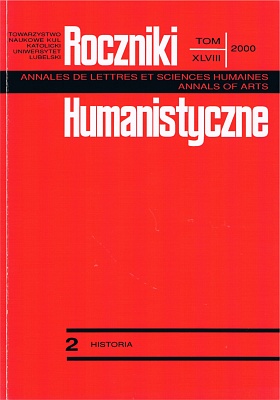Polacy w Niemczech w okresie wojny bolszewickiej 1920 roku i ich reemigracja
Abstrakt
History of Poles in Germany and their returns to Poland in the period between signing the Treaty of Versailles on 28th June 1919 and the year 1921 were almost completely left unspoken of in historical literature, both Polish and German. On the basis of archival documents found in German archives: Politisches Archiv Auswärtiges Amt, HS Düsseldorf, STA Münster, and in Polish ones: Archiwum Akt Nowych PRM iMSZ, AP Bydgoszcz it has been penetratingly shown how Poles living in Germany at that time were involved in all the most important political events; among them in the plebiscites in Warmia, Masuria, Upper Silesia, the Silesian uprisings, revolution in Germany, Kapp-Lütwitz's coup d'état, class and party conflicts in the Ruhr as well as in Berlin. Actions taken against Poles during the Polish-Bolshevik war as well as the attitude of the German authorities and of the Polish diplomatic agencies towards them have been presented in detail. For the first time data have been presented concerning the ways of re-emigration and the statistics of Poles coming back. In the election to the Reichstag in 1920 in the districts of Rhineland and Westphalia over 60 thousand votes were cast for Polish candidates. In the discussed period also several hundred Poles were elected for the District Councils of Westphalia and Rhineland as well as for the parish councils there. In many places national school courses (Volksshochschulekurse) were conducted which were attended by nearly 4 thousand people. Preparations to the re-emigration action and the course the action took were slowed down because of lack of executive regulations enabling one to choose the country to which he declared his will to move along with his belongings. Polish emigration in Germany resented lack of tax regulations between the Polish and German sides. This was the reason why the special Association for defending emigrants was established. Many Poles coming back to Poland took up important offices of voivodes, town presidents, Members of Parliament and Senators there and Jan Brejski even was a candidate for the Prime Minister of the Polish Republic. They tried to give help to Poles that were persecuted in Germany. It seems that without a thorough investigation of the situation of Poles in Germany at that period it is hard to take an objective view of the events of the following years connected with exercising the options and the `compulsory re-emigration', the problem of national minorities in both countries and to look professionally at the diplomatic game of the representatives of Poland and Germany concerning the opting people and the Polish-German relations in general.
Bibliografia
A. Poniatowska, Polacy w Berlinie 1918-1945, Poznań 1986.
F. Mańkowski, Historia ZZP, w: Ćwierć wieku pracy dla Narodu i Robotnika, Poznań 1927.
J. Brejski, Dlaczego powstało Zjednoczenie Zawodowe Polskie, w: Ćwierć wieku pracy dla Narodu i Robotnika, Poznań 1927.
Kto był kim w Drugiej Rzeczypospolitej, red. J. Majchrowski, Warszawa 1994.
J. Kozłowski, Polacy wNiemczech w XIX i XX wieku (do 1945 roku), w: Polonia w Europie, red. B. Szydłowska-Ceglowa, Poznań 1992.
Cz. Demel, J. Krawulski, K. Rzepa, Działalność Narodowego Stronnictwa Robotników i Narodowej Partii Robotniczej w Wielkopolsce w latach 1917-1937, Poznań 1980.
Richard C. Murphy, Gastarbeiter im Deutschen Reich. Polen in Bottrop 1891-1933, Wuppertal 1982, s. 140-157.
Mirosław Piotrowski, Z dziejów polskiej chadecji, „Zeszyty Społeczne KIK” 3(1995), s.40-41.
Christoph Kleßmann, Polnische Bergarbeiter im Ruhrgebiet 1870-1945. Soziale Integration und nationale Subkultur einer Minderheit in der deutschen Industriegesellschaft, Göttingen 1978.
Andrzej Gulczyński, Ministerstwo byłej Dzielnicy Pruskiej (1919-1922), [Poznań 1995, s.157,] „Prace Komisji Historycznej” – Poznań, t. L, Poznań 1995.
Polacy w Berlinie. Przyczynek do historji wychodźstwa polskiego w Berlinie po prawym brzegu Łaby. Według materjału, zebranego przez Antoniego Gołąbka w opracowaniu profesora Jana Kazimierczaka z przedmową radcy Zygmunta Zaleskiego, Inowrocław 1937, s.464-465.
M. Piotrowski, Dwunastu apostołów – czyli rozłam w chrześcijańskim ruchu robotniczym, w: Na przełomie stuleci. Naród-Kościół-Państwo w XIX i XX wieku, red. M. Piotrowski, Lublin 1997.
H.Przybylski, Chrześcijańska Demokracja i Narodowa Partia Robotnicza w latach 1926-1937, Warszawa 1980.
M.Orzechowski, Akcja plebiscytowa na rzecz Górnego Śląska w Nadrenii i Westfalii, „Zaranie Śląskie” 1965, nr28.
T.Jędruszczak, Powstania śląskie, Katowice 1959;
A.Albert, Najnowsza historia Polski 1918-1980, t. I (1918-1939), Warszawa 1989.
Pogrom Polaków w Essen, „Wiarus Polski” (Bochum) nr272 z5 XII 1920 r.
Z polskiego Sejmu. O obronie wychodźstwa, „Narodowiec” (Herne) nr5 z8 I1921r.(art. tłum.)
W obronie wychodźstwa, „Dziennik Bydgoski” nr6 z9 I1921 r.
Copyright (c) 2000 Roczniki Humanistyczne

Utwór dostępny jest na licencji Creative Commons Uznanie autorstwa – Użycie niekomercyjne – Bez utworów zależnych 4.0 Międzynarodowe.





